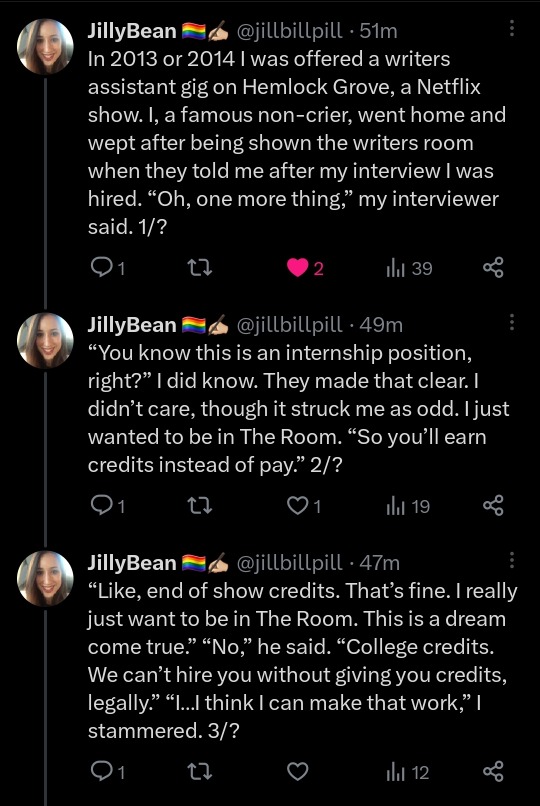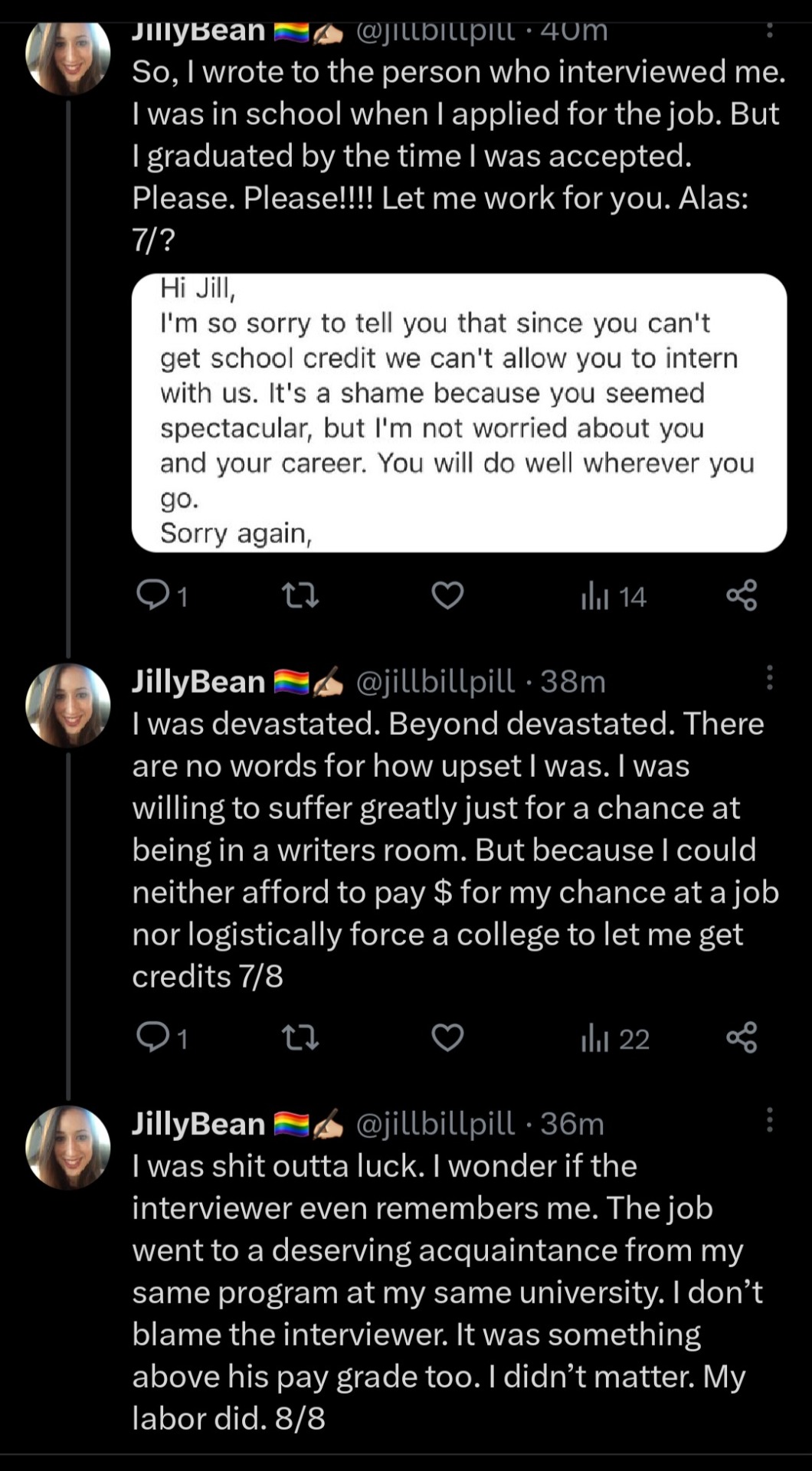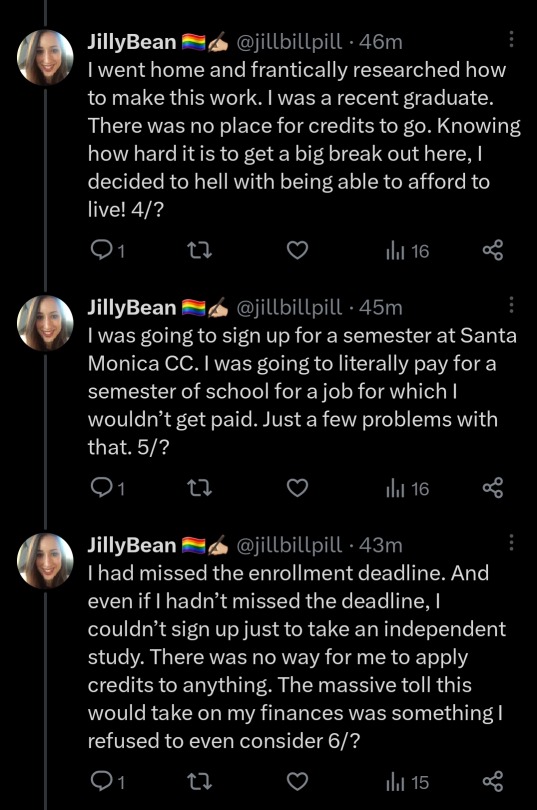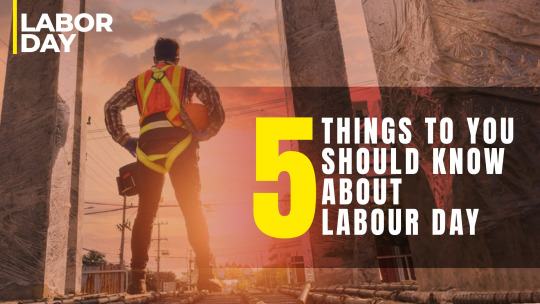#labour unions
Text



Here's how to help support those making your shows!
2K notes
·
View notes
Text
No Frills workers at 17 stores in Ontario have ratified a new collective agreement that raises wages and expands the number of full-time jobs, the union representing them has confirmed.
A press release from Unifor said the deal, which covers almost 1,300 workers, will see wages rise between $3.20 and $4.50 an hour over the duration of the agreement.
The five-year contract also includes a new benefits program for part-time workers and creates 30 new full-time positions to be filled within a year.
Continue Reading
Tagging @politicsofcanada
#cdnpoli#canada#canadian politics#canadian news#ontario#unions#labour unions#workers rights#union victories
114 notes
·
View notes
Text

The Union's Demands Are Impossible!
"A year from now, all auto companies will be out of business!"
We can keep making these cartoons because of lots of people supporting us - most only at the $2 or $1 levels - which is something I find really cool. Join us! patreon.com/barry
66 notes
·
View notes
Text
Downton Abbey's top tips for social advancement:
Get an unexpected inheritance.
Marry rich.
Study in secret and hope one of your betters will be impressed by your pluck.
Heroic sacrifice including disfigurement to save your betters.
Seduce a duke.
Blackmail.
Go work in a factory instead.
Organise with your peers for collective barganing.
Vote for redistribution of wealth.
28 notes
·
View notes
Text
just learned that my dad is a union member??? that's why he was borrowing my laptop all the time lately. he was voting in the union's elections in online meetings.
#proud of him for that ngl#its a small union tho. only like 600 people#labour unions#unions#unionize#rambles#wills mumbles
12 notes
·
View notes
Text
Love's Labour's Won - andimeantittosting (Saylee) - Supernatural [Archive of Our Own]
It’s been five years since the workplace accident that killed Dean Winchester’s father, and conditions at Roman Mills have not gotten any safer. When Dean confides in his friend Charlie, she introduces him to Cas Novak, a union organizer passionate about workers’ rights.
As they work together on the union drive, Dean and Cas bond over good food, trashy TV, Castiel’s introduction to LARPing, and their shared commitment to improving the lives of the workers at the sawmill. Cas, however, is all too conscious of the power imbalance between them.
And then there's Roman Enterprises, determined to stop them from forming a union, even if it means breaking the law, with devastating consequences for Dean and Cas’s nascent romance.
2 notes
·
View notes
Text
NSFW asks but instead of porn it's OSHA violations
7 notes
·
View notes
Text
Victory to the WGA!
After 146 days on strike the WGA has won.
3 notes
·
View notes
Text
Today is the best day to unionize your workplace!
3 notes
·
View notes
Text
I miss when we killed union scabs
11 notes
·
View notes
Text
A Starbucks on Chicoutimi's main drag in Saguenay made history in the province becoming the first of the iconic coffee shop chain to unionize.
A news release from the national federation of unions (Fédération du commerce - Confédération des syndicats nationaux: FC-CSN) said that the Administration Labour Tribunal granted union certification to the cafe at 1331 Talbot Boulevard, meaning the around 30 employees will now be union employees. They filed an application for unionization in July, the release reads.
CSN president Caroline Senneville called the decision a employee victory against a giant corporation.
Continue Reading
Tagging @politicsofcanada
#cdnpoli#canada#canadian politics#canadian news#quebec#starbucks#starbucks union#worker's rights#labour unions
131 notes
·
View notes
Text
Am on Schroedinger's Picket Line at the moment...
If my work building is behind a picket line tomorrow, as a member of a sister union, I won't be crossing. If my work building isn't being picketed, the day goes on as normal. We're supposed to be informed of picket locations by tonight sometime. Which I don't mind a bit, but it would be nice to know, as it may mean a one-hour commute just to have to leave!
I think pickets are being strategically planned for a few hours per location, though, to maximize impact and so people don't just stay home and shut down offices. Not having to leave your desk until 10 or 11 am means staff will still come to work, which means more people on campus to walk the lines. Works for the pickets, but it also means that staff in my own union don't lose a whole day's pay by striking in solidarity - they can still make it up in picket line pay.
Solidarity forever, and information please!
2 notes
·
View notes
Text
Massive win, comrades!
youtube
And we're only just starting...
#UCUrising#original#UCU#UK politics#strike#strike action#industrial action#labour unions#trade unions
9 notes
·
View notes
Text
5 Things you should know about labour Day

Open Immersive Reader
Every year on May 1st, we observe or celebrate Labour Day, which recognizes the achievements made by workers in the 1800s to secure their and our rights in the workplace. The contributions made by these workers include rights and privileges that we enjoy today, such as a minimum wage. This is the reason we celebrate the accomplishments made by Industrial Revolution-era workers on Labour Day.
What is Labour Day?
Labour Day is also known as May Day or International Workers’ Day. It originated in the 1800s in the United States, where workers were known to work for up to 12 hours a day without weekends and in difficult and often dangerous working conditions. This was during the height of the Industrial Revolution, when workers were under tremendous pressure to keep up with the rapid changes that were transforming societies.
While there were multiple strikes by workers’ unions during this period, the most famous were the nationwide strikes on May 1st, 1886, by over 300,000 workers across the United States. The most well-known was the Haymarket protest, three days later, on May 4th, in Chicago, Illinois. With these and subsequent strikes, the government changed, leading to better working conditions for generations of men and women.
Haymarket protest on May 1 led to demand that it be declared Labour Day May 1st is an official holiday in many parts of the world when employees of governments, banks and most companies have a day off from work. Labour protests and the declaration of May 1st as Labour Day saw many changes over the years, making working conditions better worldwide.
Here, we look at 5 rights we enjoy because of the labour movement.
1. Fair working hours
Before the protests began in the US in the late 19th century, workers were known to work up to 100 hours per week (around 14 hours per day) with no weekends. The main demands of the striking workers included working no longer than 40 hours per week (8 hours per day) and a 5-day work week, which is now considered the standard. These demands were based on workers ensuring they had sufficient time for their families and personal well-being.
2. Fair pay and minimum wage
Employers became increasingly wealthy during this period due to workers’ low wages and long working hours. The protests sought to achieve fair pay for the hours worked, including payment for excess hours. These protests led to a watershed moment for workers in the United States when laws were created to ensure workers were paid their fair share by guaranteeing minimum wages and overtime pay.
3. Eradication of child labour
During this time, it was common for children as young as 5 to work in factories and mines in hazardous conditions. After the May Day protests and long struggle, legislation was passed in the United States that defined the employment of children under the age of 16 as “oppressive child labour,” which employers were no longer permitted to do. The new laws also stated that the employment of children between the ages of 16-18 was not to interfere with their schooling, health or well-being. Such laws were also implemented in many countries across Europe and other places.
4. Formation of unions
The poor working conditions in the 1800s set the stage for labour unions. These were formed to strengthen and achieve the aims of the labour movement, which focused on a better work life. Unions went on to achieve specific worker rights based on gender, ethnic group and other factors. Today, unions remain a forum for employees to express their grievances and demand improved working conditions.
5. Rights for working women
Long before women even had the right to vote, they made up a significant part of the workforce. Just like their male counterparts, they too led prominent protests as early as the 1840s against extended working hours, low wages, poor safety standards and the employment of children. Employed in garment, footwear and other factories, working women played an important role in the formation of women’s labour organizations. These have helped generations of women in the workplace.
Women played an important role and their rights were recognized as part of labour demands
The first Labour Day celebration in India
During the decades-long Independence movement, Labour Day or May Day, was first observed in India on May 1st, 1923. Led by freedom-fighter Malayapuram Singaravelu, who also established the first trade union in India, the celebration took place in Chennai and called for the passing of a resolution to declare May 1st a holiday. The famous phrase “workers of the world unite” was also proclaimed against the backdrop of the freedom struggle, which sought to unburden people, including workers from different parts of the country, and lead them to freedom.
Having an 8-hour workday and the weekends free to spend time relaxing or with the family has its origins in the American workers’ strikes during the 1800s. Many workplaces nowadays emphasize a healthy work-life balance and organize workplace wellness programs for their employees. However the basic rights expected from any employer are set in stone due to the protests that led to the Fair Labour Standards Act in 1938 in the United States. Over 100 years later, people worldwide benefit from the rights secured by those who protested unfair and unjust working conditions to create more balanced, healthy, and safe working conditions.
#Labour Day#May Day#International Workers’ Day#Industrial Revolution#Workers' rights#Fair working hours#Fair pay#Minimum wage#Child labour#Labour unions#Women's rights#Haymarket protest#8-hour workday#Work-life balance#Workplace wellness programs
0 notes
Text
my grandmum freaking out and telling me to never tell ANYONE when i told her my dad's in a labour syndicate (she thought it meant like a fucking mafia type organization)
2 notes
·
View notes
Text
5 Things you should know about labour Day

Open Immersive Reader
Every year on May 1st, we observe or celebrate Labour Day, which recognizes the achievements made by workers in the 1800s to secure their and our rights in the workplace. The contributions made by these workers include rights and privileges that we enjoy today, such as a minimum wage. This is the reason we celebrate the accomplishments made by Industrial Revolution-era workers on Labour Day.
What is Labour Day?
Labour Day is also known as May Day or International Workers’ Day. It originated in the 1800s in the United States, where workers were known to work for up to 12 hours a day without weekends and in difficult and often dangerous working conditions. This was during the height of the Industrial Revolution, when workers were under tremendous pressure to keep up with the rapid changes that were transforming societies.
While there were multiple strikes by workers’ unions during this period, the most famous were the nationwide strikes on May 1st, 1886, by over 300,000 workers across the United States. The most well-known was the Haymarket protest, three days later, on May 4th, in Chicago, Illinois. With these and subsequent strikes, the government changed, leading to better working conditions for generations of men and women.
Haymarket protest on May 1 led to demand that it be declared Labour DayMay 1st is an official holiday in many parts of the world when employees of governments, banks and most companies have a day off from work. Labour protests and the declaration of May 1st as Labour Day saw many changes over the years, making working conditions better worldwide.
Here, we look at 5 rights we enjoy because of the labour movement.
1. Fair working hours
Before the protests began in the US in the late 19th century, workers were known to work up to 100 hours per week (around 14 hours per day) with no weekends. The main demands of the striking workers included working no longer than 40 hours per week (8 hours per day) and a 5-day work week, which is now considered the standard. These demands were based on workers ensuring they had sufficient time for their families and personal well-being.
2. Fair pay and minimum wage
Employers became increasingly wealthy during this period due to workers’ low wages and long working hours. The protests sought to achieve fair pay for the hours worked, including payment for excess hours. These protests led to a watershed moment for workers in the United States when laws were created to ensure workers were paid their fair share by guaranteeing minimum wages and overtime pay.
3. Eradication of child labour
During this time, it was common for children as young as 5 to work in factories and mines in hazardous conditions. After the May Day protests and long struggle, legislation was passed in the United States that defined the employment of children under the age of 16 as “oppressive child labour,” which employers were no longer permitted to do. The new laws also stated that the employment of children between the ages of 16-18 was not to interfere with their schooling, health or well-being. Such laws were also implemented in many countries across Europe and other places.
4. Formation of unions
The poor working conditions in the 1800s set the stage for labour unions. These were formed to strengthen and achieve the aims of the labour movement, which focused on a better work life. Unions went on to achieve specific worker rights based on gender, ethnic group and other factors. Today, unions remain a forum for employees to express their grievances and demand improved working conditions.
5. Rights for working women
Long before women even had the right to vote, they made up a significant part of the workforce. Just like their male counterparts, they too led prominent protests as early as the 1840s against extended working hours, low wages, poor safety standards and the employment of children. Employed in garment, footwear and other factories, working women played an important role in the formation of women’s labour organizations. These have helped generations of women in the workplace.
Women played an important role and their rights were recognised as part of labour demands
The first Labour Day celebration in India
During the decades-long Independence movement, Labour Day or May Day, was first observed in India on May 1st, 1923. Led by freedom-fighter Malayapuram Singaravelu, who also established the first trade union in India, the celebration took place in Chennai and called for the passing of a resolution to declare May 1st a holiday. The famous phrase “workers of the world unite” was also proclaimed against the backdrop of the freedom struggle, which sought to unburden people, including workers from different parts of the country, and lead them to freedom.
Having an 8-hour workday and the weekends free to spend time relaxing or with the family has its origins in the American workers’ strikes during the 1800s. Many workplaces nowadays emphasize a healthy work-life balance and organize workplace wellness programs for their employees. However the basic rights expected from any employer are set in stone due to the protests that led to the Fair Labour Standards Act in 1938 in the United States. Over 100 years later, people worldwide benefit from the rights secured by those who protested unfair and unjust working conditions to create more balanced, healthy, and safe working conditions.
#Labour Day#workers' rights#May Day#Industrial Revolution#Workers' rights#Fair working hours#Fair pay#Minimum wage#Child labour#Labour unions#Women's rights#Haymarket protest#8-hour workday#Work-life balance
0 notes